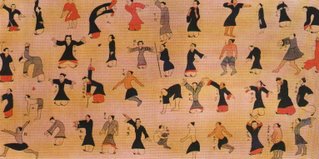Eight Pieces of Brocade Qigong for relaxation, health, and longevity.
I have been practicing the Eight Pieces of Brocade (baduanjin in Chinese) since 1997 and can personally attest to the enormous relaxation and general wellness benefits it brings. In only 10 to 15 minutes a day, you too can feel absolutely great, and promote your own excellent health and wellbeing by practicing the Eight Pieces (or Sections) of Brocade (baduanjin) Qigong. I learned from the book The Way of Energy, but have also found an excellent video called "Eight Simple Qigong Exercises For Health: The Eight Pieces of Brocade"
Dr Ken Andes, L.Ac, D.Ac. (RI) a licensed acupuncturist, board certified herbalist, and medical qigong instructor, says this about baduanjin in the January 2006 issue of “Qi Dao” newsletter:
- It is non-strenuous and can be done by anyone of any age.
- It will regulate your digestion and metabolism, thus helping with weight loss.
- It takes less than 10 minutes a day to perform.
- It is VERY easy to learn...no matter how uncoordinated you are.
- It will stretch and tone all of your muscles, thus increasing your flexibility.
- It will help relieve neck, back, and shoulder pain.
- It will make your muscles (especially your legs) stronger.
- It will stimulate your lymphatic system and help detoxify the body of environmental poisons.
- It will develop a calm, focused mind.
- It helps relieve depression and anxiety.
- It requires no special equipment and can be done anywhere, anytime.
- It will make you look and feel many years younger.
- It will harmonize and stimulate all of your acupuncture meridians, giving you a similar effect of an acupuncture treatment....without the needles!!!
What is qigong?
In any discussion of the body movement energy arts, many people will be familiar with yoga, they will have heard of taiji (t'ai chi), but few know about qigong (chi kung).
Qi gong is to China India
Kenneth Cohen, world renowned health educator, China
Personally, I love qigong mainly because it is a continuous movement, gently flowing and very relaxing. Every position, in its way, emulates water. (If you missed my earlier article on the benefits of emulating the principles of water, you may catch up with it here: "Go With The Flow."
General Health Benefits of Qigong:
Ken Cohen says: Qigong has been rigorously tested in controlled scientific experiments and clinical trials and is often used as an adjunct to conventional allopathic medical treatment. Hypertensive patients who take medication and practice qigong fare better than controls who only take the medication. Similarly, there is solid evidence that qigong can improve immune function and mental health, and prevent disabilities that come with age. Qigong acts like Vitamin C, increasing the activity of an enzyme that helps to deactivate free radicals, highly reactive chemicals that promote tissue degeneration and loss of memory.
Dr. Martin Eisen, who has studied Judo, Shotokan Karate, Aikido and Tai Chi, and has written many articles on Kung Fu, Eastern exercise and Chinese medicine, answers the question: "Does Qigong Have Anti-Aging Effects?"
"Yes. For example, one survey of aged practitioners revealed that they were in good health and appeared younger than a second group of non-practitioners. Their average blood pressure was normal and 93% had normal hearing and good memories. The non-practicing elders had a higher average blood pressure, 25% had hypertension, 50% had vision problems, 76% had hearing problems and 35% had lost their ability to work. After doing Qigong for 5 months, 52% of them recovered some of their working ability and made other physiological improvements."
Lineage and Baduanjin (Eight Pieces Brocade)
You may be familiar with the lineage concept in martial arts, that particular families hold the secrets to the only correct manner of practicing particular styles of a martial art or energy practice.
Baduanjin (Eight Pieces Brocade) is different. No single family or lineage holds the secret to Baduanjin, and indeed there are several different (and effective!) variations of this practice. Baduanjin was developed by Yueh Fei (1103-1142), a Chinese general who wanted to improve and maintain the health of his soldiers. It is believed that the practice of baduanjin is the reason his army was never defeated. Even today, hundreds of years later, the "eight pieces of brocade" qigong remains an extremely popular and beneficial practice.
Eight Pieces Brocade is so called for the silk scroll discovered in 1979 and dated to the Western Han dynasty (206 BC to AD24) which shows 44 drawings of people practicing movements like the ones found in Baduanjin. The original name for this practice may have been "Dao Ying Xing Qi Fa (Method of Inducing Free Flow of Chi)."

Get started now with Eight Pieces of Brocade!
No comments:
Post a Comment